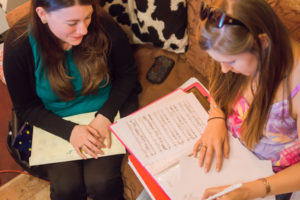A year on from her first short play being staged, Editor Jennifer Richards reflects on what she’d go back and tell herself (when she gets her hands on a time machine…)
I never studied playwriting. In fact, I’m completely degreeless! I’ve learn through reading plays, Google and, whenever I’m lucky enough to chat to anyone from the theatre industry, asking lots and lots of questions.
And, a year on from when my first short play was staged, I’ve learnt about form, characterisation, dialogue, action and all that good stuff. But there’s other learning curves, outside of actual playwriting techniques and tips, that I’ve just been experiencing as I go.
This includes how to look after my wellbeing and how to find a community within theatre, and also what it means to actually call yourself a writer. Because, as it turns out, playwriting is a lot more than just the words on the page.
So, here are the five things I wish I’d been told before I started writing:
None of the writers I know write full time. Often they’re a writer slash something, whether that’s a teacher, lawyer or actor.
But I used to worry that if I wasn’t constantly working on something new, I’m not allowed to call myself a writer. Like some sort of weird theatre police would appear and snatch the title off me.
I wish I’d just been more gentle with myself, as balancing a job, seeing friends, and looking after my health, all alongside writing, can be tricky at times. I definitely shouldn’t be making myself go to bed at ridiculous times just so to squeeze in writing a few more scenes.
And it’s not just a matter of finding the time. Sometimes I need to take a break from writing to recharge and find something to spark a story again. Turns out it’s counterproductive to glue my hands to my laptop, as I definitely won’t be creating anything interesting if all my creativity’s gone…
2. Don’t be scared to share your work
I’m sure I’m not alone in being scared of people’s judgments. I never wanted to share my writing with others for fear someone would take one look at it and throw it in the bin.
But feedback is such a vital part of playwriting, which I found when I forced myself to share my writing my joining a writers’ course (which I highly recommend if you have the fear like me!)

Now receiving this feedback is what keeps me going in the re-drafting process. It’s encouraging, rather than scary, to know I’ve discussed and shaped this idea with others, and feedback from them has helped spark new directions for the script.
3. You don’t need to know all the answers when you start writing
My old English teacher ingrained in me the saying: ‘If you fail to plan, you plan to fail’. Though he was talking about essays, I also applied it when it came to playwriting, believing that if I hadn’t worked out exactly what was happening in each scene before I started writing, the script would be a mess.
But I’ve found that writing to a storyboard feels constricting, as I force myself to cover each bullet point, rather than led my characters led my story in a direction that feels more truthful.

Now when I write, I often don’t know what the script’s really about until I finish the first draft. It’s only after having written the script that I then plan, reading back through it to find out what the story is and what I’m really trying to say. Then the script goes through quite a dramatic editing stage!
4. Writing doesn’t have to be a solitary activity
We might picture the writer as a lone wolf, sat alone at their desk, but the brilliant thing about theatre is how many people are needed to bring a script to life.
I’ve got to work with directors, actors, producers, set designers, stage managers, dramaturgs, fellow writers and so many more. And getting to work with a team makes writing feel like a pretty sociable job!
If you’re looking for it to be even more sociable, write in cafes or co-working spaces, or even join a writers’ group!
5- Just because you love writing, doesn’t mean it should take over your life
‘Pursue your passion’ is a cliché that my old Head of Year would have (correctly) told me off for writing in my UCAS application. But by being a part of scratch nights, or taking my plays to fringe shows, or even by joining a theatre group, that’s exactly what I’m doing.
And because writing’s my passion and something I’ve always dreamt of doing, it’s really easy for me to let it take over my whole life. To cancel plans as I’ve got writing deadlines to meet, or to stay up all night stressing as I know people are waiting on me to finish scripts.
But just because something is a passion, it’s not a reason for me to let it be all-consuming. I’ll often find myself committing to more writing opportunities than I can manage as I’m so scared to let an opportunity slip through my fingers and for my dream (more clichés, I’m sorry) to suddenly fade.
And honestly? I’ll hold up my hands and say I’ve not quite managed to find the right balance yet of pursuing writing opportunities while not burning myself yet. But I’m learning that it’s okay to say no. Because even though the dream may be writing, I don’t want to end up hating it while I work to make it a reality.



